
欧州はデータ環境整備から次ステージへ
ヨーロッパのデータ環境整備は、一次フェーズが終わり新たなステージに入ってきました。データを利活用する基礎環境が整備され、様々なプロジェクトが円滑、迅速に実施できるようになってきています。まるで、でこぼこ道から高速道路に入ったように今後の取り組みの加速が予見されます。2030年に100%の行政手続きデジタル化を目指していますが、それを遥かに超えたデジタル社会ができてくるのではないでしょうか。
ヨーロッパ最大規模の行政データの会議
3/16-3/19にENDORSE(The European Data Conference on Reference Data and Semantics)が欧州出版局(The Publications Office of the European Union)と情報局(DGinfomatics(DGIT))の共催で行われました。

これまでもEUはデータに関する会議のSEMICを毎年開催してきましたが、今回のENDORSEは、欧州出版局が主催し、より大規模な会議として行われています。内容も大きく拡充され、これまでのSEMICではSemanticsを中心にした取り組みにフォーカスしてきましたが、ENDOESEではデータの流通まで含んだ全体的な取り組みを対象にしています。
1日目はデータ環境についてオーバービューし、2日目は従来からSEMICでも議論してきたLegal Technologyをテーマにしています。3日目は従来は調達専門家で議論されてきた調達情報をテーマとし、最後の4日目にデータスペースについて集中的に議論を行っています。
データ環境整備の流れ
ECは、これまで、DGconnectを中心に推進してきた機能コンポーネントのビルディング・ブロック群であるCEF(Connecting Europe Facility)(2014-2020)、DGinfomatics(DGIT)が推進してきたインターオペラビリティのための標準やツール作りのISA(Interoperability solutions for public administrations, businesses and citizens)(2009-2015)およびISA2(2016-2020)を進めてきました。これらの取り組みは、EIF(European Interoperability Framework)、eIDAS、ContextBroaker、Core Vocabulary等があり、着実に成果を上げるとともに社会に浸透しつつあります。
CEF、ISA2の両プログラム共に2020年12月に終了しましたが、CEF はその成果を生かしてCEF2 Digital(2021-2027)として継続して進めることとなっています。ISA2は4月末まで意見募集を行う等の評価をしているところですが、以下の考え方のもとで2021年中に次期方針が示される予定です。
‘A reinforced EU governments’ interoperability strategy to ensure coordination and common standards for secure and borderless public sector data flows and services’
さらに、CEFとISA2の成果を生かして2021年1月からDEP(Digital Europe Programme)が進められています。
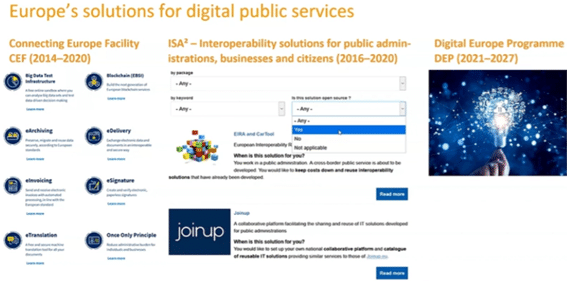
主な取り組みは、人工知能や人材育成やデジタルの技術開発がありますが、これらと並んで中核をなすのがデータであり、2020年3月に公表されたEU Data Strategyを強力に進めていくこととなっています。

DEPでは、これらの成果を発射台にして基本方針を以下のように整理しています。特に、インタオペラビリティを前提に、データ連携基盤(GAIA-X、IDS等)を強力に進めていく方向です。
From CEF and ISA2 to DEP
• The CEF building blocks and ISA2 solutions are mature and in operation.
• GAIA-X and I don't re-invent the wheel but enable interoperability.
• The existing CEF and ISA2 solutions can be made ready for GAIA-X and IDS compatibility.
• An in-depth assessment is in progress.
この流れを整理すると今後の大きな流れは以下のように表せます。
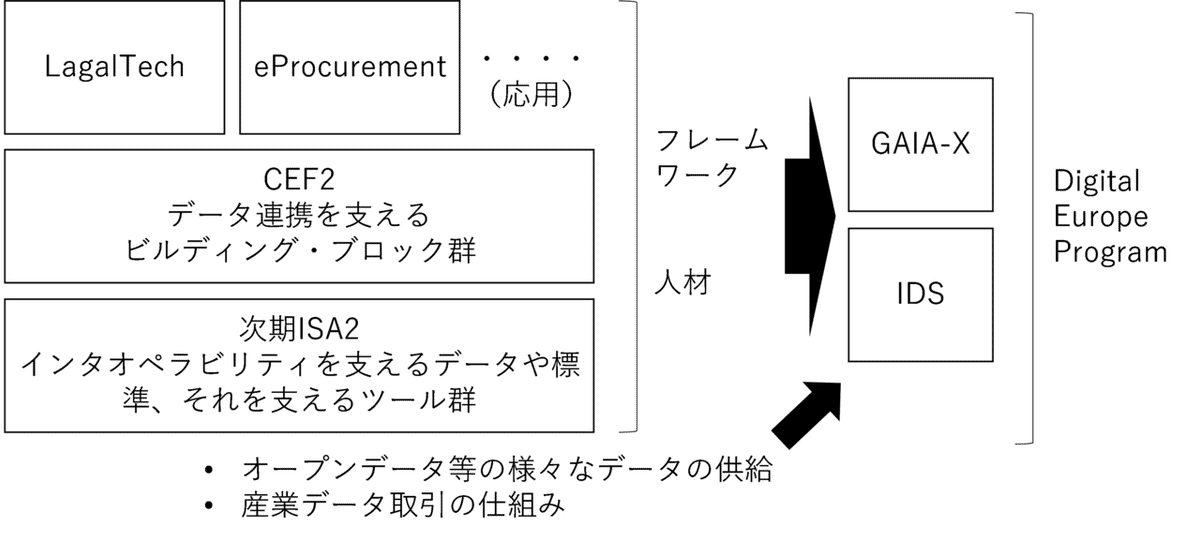
また、このDEPを実現するためのキーワードとして、「メタデータ」や「標準」の重要性が強調されるとともに、データ項目名やデータ内容の用語・表現を正しくするための「オントロジ」、「セマンティックス」、「タクソノミ」に関する議論が多くおこなわれました。また、データを適切に活用、連携できる環境の前提として、「品質」や「トラスト」の議論も盛んにおこなわれていました。
DEPの中核となるデータ戦略
DEPは、データを使うことを前提に進められています。では、欧州のデータ戦略はどのようなものでしょうか。
DEPの背景となる問題認識は、「データ量が十分ではない」、「分野毎の分断がある」、「法律等を統合的なアプローチになっていない」等、世界で共通的な課題が挙げられています。

その認識のもと、統一されたマーケット形成を、DEPの戦略として目指しています。そのため、高品質なデータを求めるとともに、データの価値に着目し、また、クリアなガバナンスメカニズムを作ろうとしています。

戦略だけではなく法律等の整備を進めています。「トラスト確保」、「個人情報に関するマーケットパワーへの規制」、「公益のためのハイバリューセット定義」、「官民でデータに関するフェアネス確立」の4つのキー項目を順次進めていき、さらに、それらを実効性のあるものにするために、2021年末までに各分野の規制で補完しようとしています。

なかでもデータ標準化を重視し、FAIR原則にも配慮しつつデータを使いやすい環境を整備していきます。また、技術標準やEIFのアーキテクチャを活用することにより、分野横断のデータ利活用を推進していきます。
A European strategy for data & standards
The framework will reinforce the necessary structures in the Member States and at EU level to facilitate the use of data for innovative business ideas, both at sector- or domain-specific level and from a cross-sector perspective. It will build on recent initiatives in the Member States and in individual sectors to address one or more of the following issues:
● strengthen the governance mechanisms at EU level and in the Member States relevant for cross-sector data use and for data use in the common sectoral data spaces, involving both private and public players. This could include a mechanism to prioritise standardisation activities and to work towards a more harmonised description and overview of datasets, data objects and identifiers to foster data interoperability between sectors and, where relevant, within sectors. This can be done in line with the principles on Findability, Accessibility, Interoperability and Reusability (FAIR) of data taking into account the developments and decisions of sector-specific authorities
● The application of standard and shared compatible formats and protocols for gathering and processing data from different sources in a coherent and interoperable manner across sectors and vertical markets should be encouraged through the rolling plan for ICT standardisation and (as regards public services) a strengthened European Interoperability Framework.
● A first priority for operationalising the [data strategy] vision is to put in place an enabling legislative framework for the governance of common European data spaces (Q4 2020). Such governance structures should support decisions on what data can be used in which situations, facilitate cross-border data use, and prioritise interoperability requirements and standards within and across sectors, while taking into account the need for sectoral authorities to specify sectoral requirements.
● Secondly, the Commission will work on making more high-quality public sector data available for re-use, in particular in view of its potential for SMES.
● In order to open up key public sector reference data sets for innovation, it shall start the procedure for the adoption of an Implementing act on high value data sets under the Open Data Directive, making these data sets available across the EU for free, in machine-readable format and through standardised Application Programming Interfaces (APIS).
「Legislative framework for the governance of common European data space」が作成されていく予定です。また、2021年の第二四半期にハイバリューデータセットの公開方針を出す予定になっています。
ハイバリューデータセットはオープンデータを想定して、郵便番号、地図、エネルギ消費、衛星画像、天気、統計、法人、モビリティが候補に挙げられています。各国で行われているベースレジストリのうちオープン化できる部分は一体として推進されていくと考えられます。

DEPのこれらの取り組みを通じて、欧州全体かつ分野横断のCommon European Data Space(CEDS)を実現していきます。

CEDSを実現するため、「部門に守られたデータの再利用」、「データ仲介者のフレームワーク」、「利他的行為のフレームワーク」、「調整と相互運用のためのガバナンス体制」を4本の柱とするデータガバナンス法が制定されました。

DEPを実現する全体像と推進体制
データガバナンス法では、この法律を強力に推進するために、欧州データイノベーション・ボードを設置することとしています。欧州委員会へのデータに関する助言、技術標準のガバナンス、各組織の調整が求められています。
European Data Innovation Board (Chapter VI)
● Advising and assisting the Commission in developing a consistent practice for re-use, data intermediaries and data altruism entities;
● Governance of technical standardisation to enhance interoperability;
● Facilitating the cooperation of the work of national competent authorities for enhanced data use.
特に、データ標準化に関してはデータの優先順位付けを行うとともに、組織間の調整などをすることが求められています。
The European Data Innovation Board: its role on standardisation
● The Board should support the Commission in coordinating national practices and policies on the topics covered by this Regulation, and in supporting cross sector data use by adhering to the European Interoperability Framework (EIF) principles and through the utilisation of standards and specifications (such as the Core Vocabularies and the CEF Building Blocks), without prejudice to standardisation work taking place in specific sectors or domains.
● Work on technical standardisation may include the identification of priorities for the development of standards and establishing and maintaining a set of technical and legal standards for transmitting data between two processing environments that allows data spaces to be organised without making recourse to an intermediary. The Board should cooperate with sectoral bodies, networks or expert groups, or other cross-sectoral organisations dealing with re-use of data
Article 27: The Board shall have the following tasks:
[...]
(c) to advise the Commission on the prioritisation of cross-sector standards to be used and developed for data use and cross-sector data sharing, cross sectoral comparison and exchange of best practices with regards to sectoral requirements for security, access procedures, while taking into account sector-specific standardisations activities;
(d) to assist the Commission in enhancing the interoperability of data as well as data sharing services between different sectors and domains, building on existing European, international or national standards;
このガバナンス体系のもとで各プロジェクトはDGconnect主導で推進されます。各分野における十分で高品質なデータ供給、それを実現するための分野横断のサポートセンター、オープンデータポータル、ハイバリューデータセットが基盤を支え、クラウドやAIの環境を整備し、テストベッドや実証フィールドで高度化を図っていきます。
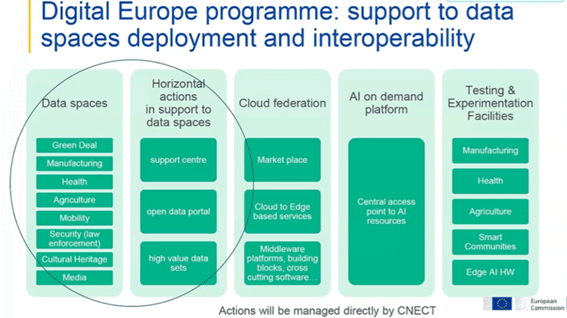
データスペースに対してはサポートセンターを整備して支えていきます。サポートセンターは、関係者間の人的ネットワークを作ることからスタートし、関係者に対して共通のビルディング・ブロックの導入などを支援していきます。
The Data Spaces Support Centre in Digital Europe
The objective of this action is to set up and operate a Support Centre, which coordinates all relevant actions on sectorial data spaces and makes available technologies, processes, standard and tools that will allow reuse of data across sectors by the public sector and European businesses, notably SMEs.
The creation of the Support Centre will have two main work strands:
1. The first work strand will support the creation of a network of stakeholders.
2. The second strand will aim to create a platform to support the knowledge exchange between all actors in the data economy and provide support for the deployment of the common building block(s) necessary for implementation of sectoral common data spaces.
ところでGAIA-XやIDSってなんですか?
GAIA-Xは、欧州が次世代のデータ連携のための基盤として整備している仕組みであり、アーキテクチャに基づき体系化が図られています。

IDSは産業界のデータ交換の具体的なメカニズムを提供しており、GAIA-Xの基盤にもなっています。FIWAREやCEFが推進するコンテクストブローカを使ったデータ連携ネットワークの技術的枠組みを推進しています。
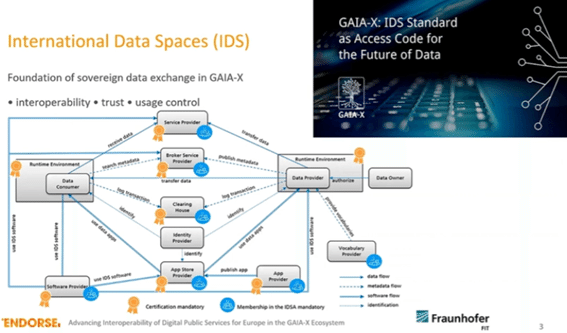
IDSの中ではデータに関して多面的な検討を行っており、各種標準を活用した6つのCによる情報モデルを示しています。GAIA-Xと同様に、Self Discriptionをベースに考えていることは重要なポイントだとと思います。
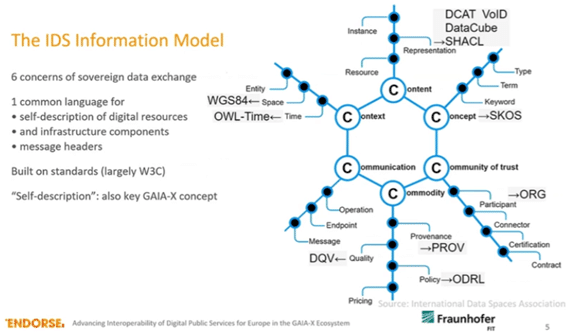
おわりに
ここでは、メインストリームの流れを記載しましたが、LegalTechや調達も重要な取り組みなので別途後日整理していきます。また、米国も2020年のアクションプランの評価を行っているので、それも整理していきます。
感想ですが、データ駆動社会を作るのにやることはたくさんあるなと改めて実感しました。
この記事が気に入ったらサポートをしてみませんか?
